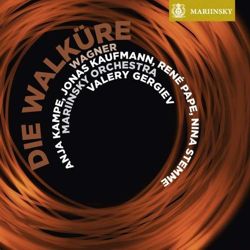|
|
|
|
|
|
|
|
|
The Boston Globe, March 02, 2013 |
| JEFFREY GANTZ |
|
|
|
WAGNER: “DIE WALKÜRE” |
|
| Valery Gergiev; Mariinsky Orchestra |
| |
 If
you close your eyes and just listen to the opening bars, you can picture
Valery Gergiev’s trademark fluttering fingers as he launches the storm that
drives Siegmund to the house of his enemy Hunding. The first installment of
this Russian “Ring” gives Wagner’s epic a human face, now turbulent, now
tender, always dramatic but never tendentious. Gergiev’s own St. Petersburg
orchestra is crisp and bracing; the thunder and lightning that announce
Hunding’s pursuit are as bright and cutting as Siegmund’s sword. If
you close your eyes and just listen to the opening bars, you can picture
Valery Gergiev’s trademark fluttering fingers as he launches the storm that
drives Siegmund to the house of his enemy Hunding. The first installment of
this Russian “Ring” gives Wagner’s epic a human face, now turbulent, now
tender, always dramatic but never tendentious. Gergiev’s own St. Petersburg
orchestra is crisp and bracing; the thunder and lightning that announce
Hunding’s pursuit are as bright and cutting as Siegmund’s sword.
This
is, also, a “Walküre” in which the vocalists sing to each other rather than
to the audience. It revolves around René Pape’s fragile Wotan, who in his
pursuit of power has renounced love and is painfully aware of what that will
cost him. Jonas Kaufmann offers a bluff Siegmund who has no qualms about
marrying his already married sister; Anja Kampe grows into Sieglinde,
blindly ecstatic at first, then sober and terrified. Nina Stemme’s
Brünnhilde is a little closed and mature-sounding at the top, but she’s
emotionally open in her confrontations with future father-in-law Siegmund
and actual father Wotan.
The one disappointment is the closing pages.
Brünnhilde’s transformation from dad’s “Wunschmaid,” or filial extension of
his will, to independent woman is the pivot on which “Götterdämmerung,” and
thus the entire “Ring,” will turn; it needs the kind of weight Furtwängler
and Knappertsbusch used to bring to it. Gergiev is all magic fire at this
point; he blazes but lacks substance. Still, for nearly four hours, this is
an incendiary “Die Walküre” that augurs well for the rest of the set.
|
|
|
|
|
|
|
|
|
|
|
|
|
|
|
|
|
|
|